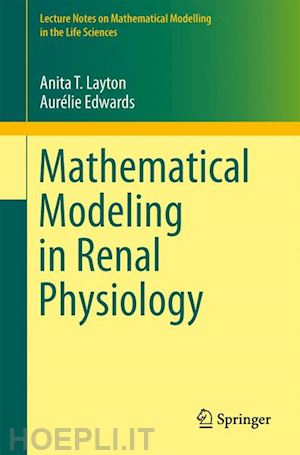
Questo prodotto usufruisce delle SPEDIZIONI GRATIS
selezionando l'opzione Corriere Veloce in fase di ordine.
Pagabile anche con Carta della cultura giovani e del merito, 18App Bonus Cultura e Carta del Docente
With the availability of high speed computers and advances in computational techniques, the application of mathematical modeling to biological systems is expanding. This comprehensive and richly illustrated volume provides up-to-date, wide-ranging material on the mathematical modeling of kidney physiology, including clinical data analysis and practice exercises. Basic concepts and modeling techniques introduced in this volume can be applied to other areas (or organs) of physiology.
The models presented describe the main homeostatic functions performed by the kidney, including blood filtration, excretion of water and salt, maintenance of electrolyte balance and regulation of blood pressure. Each chapter includes an introduction to the basic relevant physiology, a derivation of the essential conservation equations and then a discussion of a series of mathematical models, with increasing level of complexity.
This volume will be of interest to biological and mathematical scientists, as well as physiologists and nephrologists, who would like an introduction to mathematical techniques that can be applied to renal transport and function. The material is written for students who have had college-level calculus, but can be used in modeling courses in applied mathematics at all levels through early graduate courses.
1.Introduction: Basics of Kidney Physiology.- 2.Glomerular Filtration.- 3.Urine Concentration.- 4 Counter-current Exchange Across Vasa Recta.- 5.Tubuloglomerular Feedback.- 6.Electrophysiology of Renal Vascular Smooth Muscle Cells.- 7.Vasomotion and Myogenic Response of the Afferent Arteriole.- 8.Transport Across Tubular Epithelia.- 9.Solutions to Problem Sets.- Index.
Anita Layton is a faculty member in the Department of Mathematics at Duke University. In her work, she uses mathematical analysis and computational techniques to investigate aspects of kidney physiology, including the means by which the kidney controls blood flow or produces a highly concentrated urine during periods of water deprivation.
Aurélie Edwards is a director of research at the French National Center for Scientific Research, with a background in biological engineering. Her modeling work focuses on elucidating cellular signaling pathways in renal capillaries and tubules and the role of vasoactive agents in regulating oxygen balance and salt transport in the kidney.











Il sito utilizza cookie ed altri strumenti di tracciamento che raccolgono informazioni dal dispositivo dell’utente. Oltre ai cookie tecnici ed analitici aggregati, strettamente necessari per il funzionamento di questo sito web, previo consenso dell’utente possono essere installati cookie di profilazione e marketing e cookie dei social media. Cliccando su “Accetto tutti i cookie” saranno attivate tutte le categorie di cookie. Per accettare solo deterninate categorie di cookie, cliccare invece su “Impostazioni cookie”. Chiudendo il banner o continuando a navigare saranno installati solo cookie tecnici. Per maggiori dettagli, consultare la Cookie Policy.